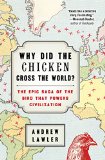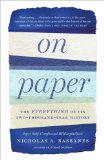Summary | Excerpt | Reviews | Beyond the book | Read-Alikes | Genres & Themes | Author Bio

The Fate of the Fruit That Changed the World
by Dan KoeppelLike your fruit locally
grown? Enjoy variety? Prefer non-GMO food?
Like bananas?
That's cognitive dissonance for you. The
banana you eat is likely from Ecuador and
identical to every other banana of its
species. Modified oft in the past, banana
growers are now trying to save it from
extinction-threatening disease - by genetic
modification.
All that and far more are in Banana
by Dan Koeppel.
It's not the first book on the banana
(others include Banana Cultures:
Agriculture, Consumption, and Environmental
Change in Honduras and the United States
by John Soluri (2006); Bananas: An
American History by Virginia Scott
Jenkins (2000); and Banana Wars — the
Price of Free Trade: A Caribbean Perspective
by Gordon Myers (2004). But there may be
good reason for a new one because the staple
of many a fruit bowl and lunch box is
threatened by extinction - and it's not the
first time.
So consider the banana. For, as my dad used
to say, "What's with the banana — once you
peel the skin off and throw away the bone
... what's left?"
Quite a bit, actually.
Maybe it started in Eden, where the fruit of
the tree of knowledge of good and evil might
have been a banana. (Musa sapentium,
the botanist Linnaeus named it —the "wise
fruit".)
Maybe it started in Africa, then moved to
Southeast Asia, then on to Central and South
America. (Some of those bananas you wouldn't
want to meet, let alone eat.)
Today, the banana is here and we love it.
More than apples and oranges (to which, yes,
we can compare bananas). We love bananas!
But although the banana is for everyone, the
whole book may not be. However, because it's
superbly organized you can easily skip to
the parts you prefer.
Starting in Eden, Koeppel devotes the first
fourth of the book to the science and spread
of the non-commercial banana. The middle
half of the book explores the history of the
fruit's transformation to what we think of
today when we think of bananas. This is
fascinating — ripe, if you will — with wars
and revolutions, history and literature,
business and politics, and enough colorful
characters and events for a half-dozen
movies. We see the birth of the United Fruit
Company, now better known as Chiquita, and
the rise of its major competitor, Dole. We
hear of wars and rumors of war, fomented —
planted — by the same banana companies and
abetted — cultivated — by the U.S.
government. The last quarter of the book
goes toward today, where the banana is
threatened by disease while growers and
scientists seek a cure.
For me the slowest slog was the science, not
for its poor quality but because I wanted to
get to the history. A second quibble is the
small chapters, some as few as three pages
and none longer than 10, which present
stories more like a magazine would. Indeed,
the book began as magazine material: one
article the author read and at least one
that he wrote. Even that, though, makes the
book easily digestible, although I prefer
books that weave together less discernibly.
Nevertheless, there's a ton of information
here and Koeppel writes engagingly as the
long-form journalist he is, and includes a
useful timeline and index.
![]() This review was originally published in The BookBrowse Review in February 2008, and has been updated for the
January 2009 edition.
Click here to go to this issue.
This review was originally published in The BookBrowse Review in February 2008, and has been updated for the
January 2009 edition.
Click here to go to this issue.

If you liked Banana, try these:

Why Did the Chicken Cross the World?
by Andrew Lawler
Published 2016
From ancient empires to modern economics, veteran journalist Andrew Lawler delivers a sweeping history of the animal that has been most crucial to the spread of civilization across the globe - the chicken.

by Nicholas A. Basbanes
Published 2014
A consideration of all things paper: Entertaining, illuminating, irresistible, a book that masterfully guides us through paper's inseparability from human culture.
Your guide toexceptional books
BookBrowse seeks out and recommends the best in contemporary fiction and nonfiction—books that not only engage and entertain but also deepen our understanding of ourselves and the world around us.